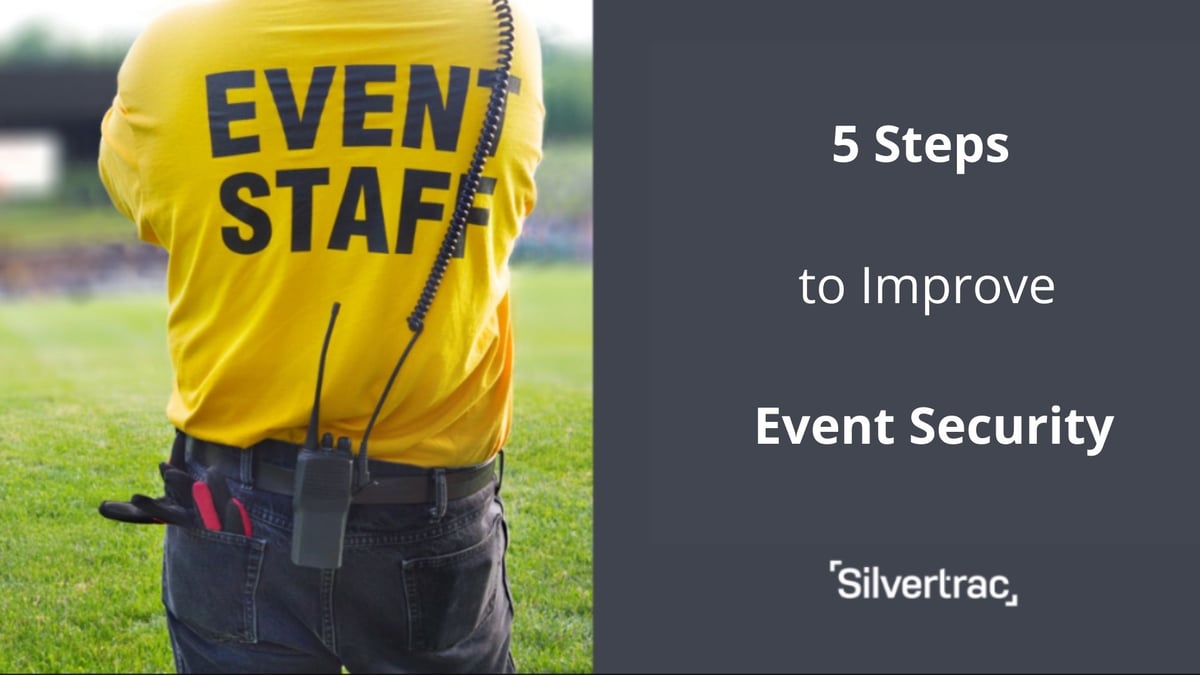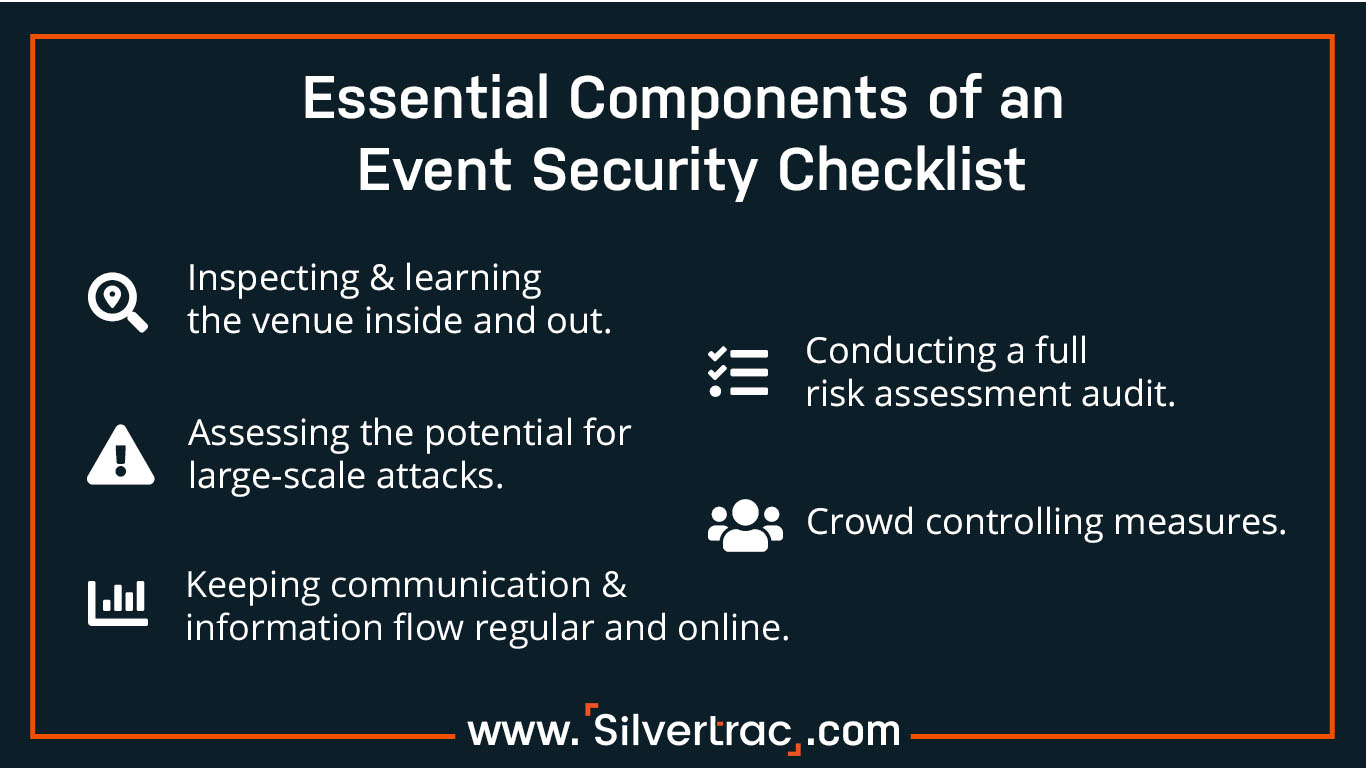The Silvertrac Extra
Event Security Planning: 5 Steps to Improve Event Security

Special event security planning is a massive undertaking. There is a laundry list of unique requirements & components that must come together for any event to be considered successful. But one of the most important aspects of any large-scale event is contracting with a security guard company that understands the nuances of event security.
Event security officers must be able to maintain and manage large crowds, an already challenging task that is exacerbated when alcohol is served on-site.
An experienced security team must be able to handle situations discreetly and quickly, so the attendees continue to enjoy the event. Because of the risks of potential threats at special events, your security team must be well-trained with experience in risk management, first aid, and crowd control.
But that's just the beginning. In this article, we will discuss:
5 essential factors to a successful event security plan
- Qualifying Your Company to Offer Event Security Services
- Pre-Event Venue Inspection
- Working with Local Officials
- Event Security Management During the Special Event
- Post-Event Review
Qualifying Your Company to Offer Event Security Services
The first step to ensuring better event security is to make sure your security company is operating in compliance with all regulations within the state where the event is being held.
To offer security services at all, you must:
- Hold a Private Patrol Operators license (PPO)
- Have liability insurance,
- Employ officers who hold a valid security officer license and have passed a thorough background check.
The next step is convincing clients that your company is capable of handling event security contracts.
Many event planners will look at what events a company has worked on in the past. They will look at things like event type and event size to find a company that is capable and experienced to handle all their event security needs.
This can make winning event security contracts difficult if you are trying to break into the industry. But there are a few things you can do to give yourself opportunities to step into the event space:
- Hire security guards - either permanently or for specific contracts. Look to hire security guards who have a lot of event security experience. If you can show that the team that will be on the ground is capable, you might be more likely to win the contract.
- Find people qualified to be armed guards or who are first aid and CPR certified. Security personnel with these skills are great additions to your roster for events. It is common to see dehydration, heatstroke, and victims passing out at large events like music festivals. Having a security officer equipped to deal with basic medical needs will help to ensure attendees get attention immediately.
- Start small. If you haven’t provided security for events before, look for small opportunities to put a portfolio together. This could mean subcontracting with a larger company in your area that needs help with a larger event, or asking your current clients for referrals to run security for small events.
Pre-Event Venue Inspection
Many event venues are large spaces full of multiple entrances/exits, hallways, and hiding places—dozens to hundreds of potential security threats. A pre-event venue inspection checklist is important for your security guards to familiarize themselves with the space they will be working in.
During the pre-event inspection, event planners and their security team should determine all security checkpoints, officer posts, points of concern, and any other special requirements for that specific venue and event.
A well thought out, step-by-step event security checklist should include
- Inspecting & learning the venue inside and out.
- Conducting a full risk assessment audit.
- Assessing the potential for large-scale attacks.
- Crowd controlling measures.
- Keeping communication & information flow regular and online.

By going through this event security checklist together, both the event planners and security company can discuss what the best security operation is for the event and set expectations early.
Working with Local Officials
Most events will have local law enforcement officials & first responders on-site for the day of the event, like EMTs or firefighting personnel. In these instances, it’s important that your security team works with local law enforcement to make sure the appropriate teams are familiar with the security operation.
For events that don’t have local officials on-site, there is still potential that they may need to be called in. In this case, the contracted security team should have a plan of action in place that clearly defines how and when a security officer should reach out to these entities.
Event management and staff should review this plan of action prior to the start of the event. All staff members (security and non-security personnel) must be familiar with all safety protocols in case an incident should occur.
Event Security Management During the Special Event
One of the most important parts of your event security plan is security management during the actual event. All your pre-work and due diligence are essential to setting you up for success on the day of the event.
This is where your security team needs to be prepared to handle crowd management and monitor for potential threats and suspicious activity.
Crowd Control Tips:
- Keep exits clear and ask event attendees to move if they are blocking exits.
- Carefully monitor the ticket and registration lines and prevent cutting.
- Closely watch VIP areas and staff-only areas in the venue.
- Keep track of your capacity by counting all staff and security personnel as well as admittees to the event.
Threat Monitoring Tips:
- Check the bags of all guests and search for weapons (PRO TIP: let guests know about bag checks in advance and let them know it’s for guest safety).
- Watch for suspicious or strange behavior such as guests constantly staring at staff and guards and disengagement in the event.
And don’t forget, one of the most important things you can do is keep the lines of communication open. Your venue security team should be in constant contact about suspicious activity. This will not only keep the event guests safe but your security team too.
Post-Event Review
After the event, you should debrief both internally with your security guards and with the client to review how the event security went. This exercise allows all parties to see where they were successful and where they could improve.
If an incident occurred that wasn’t handled properly, this is a chance to figure out what went wrong so it doesn’t happen again. The review process also gives supervisors a chance to give kudos to officers who went above and beyond and/or identify security officers who need additional training.
Event Security Planning Next Steps
While it may seem like a large undertaking, creating a well-thought-out security plan and executing at a high level ensures everyone has their bases covered. By getting qualifications in order, running through pre-event tactics, working with local authorities, and conducting a post-event review, you can be sure all attendees and hosts will leave happy and safe.
Looking for more security resources? Subscribe to Silvertrac Extra today!




